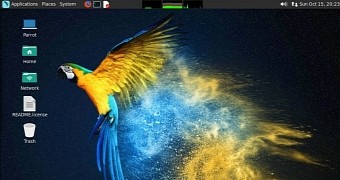ParrotSec devs released today a new stable version of their Debian-based Parrot Security OS ethical hacking and penetration testing GNU/Linux distribution.
There are many enhancements implemented in the Parrot Security OS 3.10 release, but the biggest new feature is the introduction of a full Firejail and AppArmor sandboxing system that should proactively protect the operating system from attacks by isolating its components with the combination of various security techniques.
"The first experiments were already introduced in Parrot 3.9 with the inclusion of Firejail, but we took almost a month of hard work to make it even better with the improvement of many profiles, the introduction of the AppArmor support and enough time to make all the tests," reads today's announcement.
Includes Linux kernel 4.14 LTS and Firefox Quantum
Another important change introduced in Parrot Security OS 3.10 is the latest Linux 4.14 LTS kernel, which is supported upstream with maintenance update for a couple of years, as well as Mozilla's latest Firefox Quantum (57.0) web browser, bundled with ParrotSec custom profile and add-ons thanks to contributions of the Italian Mozilla Community.
Among the hacking tools included in this release, we can mention Metasploit Framework 4.21, Maltego 4.1, which consists of the Maltegoce and Casefile tools. Several other tools were updated as well in Parrot Security OS 3.10, which comes with all the latest security patched from the upstream Debian GNU/Linux repositories.
For the first time, the Parrot Security OS developers included a todo list and planner program, a mind map designer, and PIM (Personal Finance Management) suite in their security-oriented GNU/Linux distribution, with the promise that they will include a new user-friendly installer too in a future release of the OS.
Parrot Security OS 3.10 is available for download right now through our web portal of Linux software, and it's available as Full and Home editions for both 32-bit and 64-bit computers. Existing users are urged to update their installations using the "sudo apt update && sudo apt full-upgrade" command in a terminal emulator.

 14 DAY TRIAL //
14 DAY TRIAL //